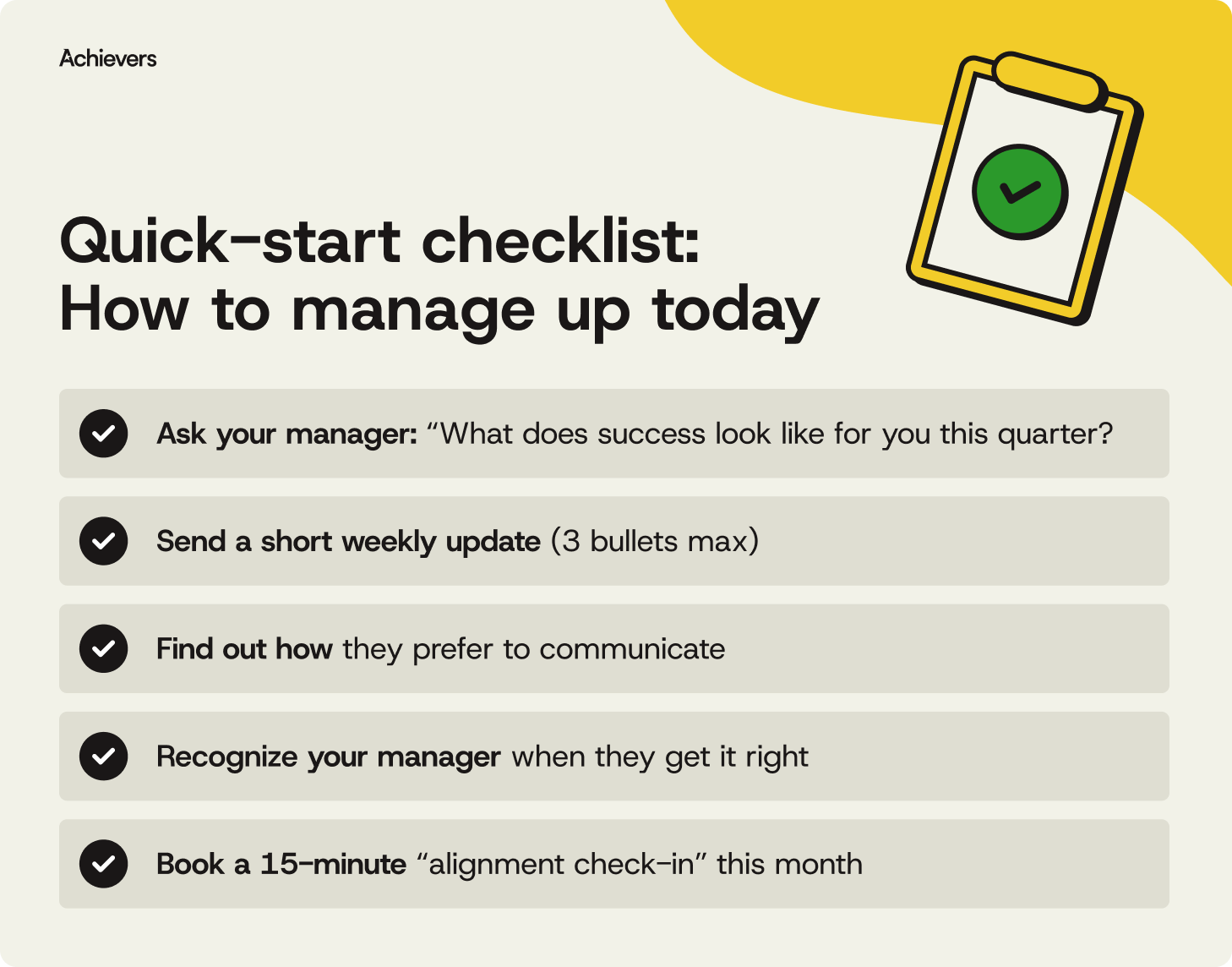Table of contents
Create a culture that means business™
Schedule a demo with an Achievers solution expert today.
Managing up isn’t about kissing up. It’s about stepping up and taking ownership of your relationship with your manager so you both thrive. Whether you’re trying to gain trust, reduce friction, or simply get more done, managing up is one of the most overlooked and underrated skills in today’s workplace.
The good news? It’s easier than you think. Done right, it’s also one of the simplest ways to strengthen workplace relationships and boost employee engagement. With a few simple habits, you can build a stronger, more productive relationship with your manager — the kind that clears roadblocks, creates opportunities, and yes, makes work feel a little less like… work.
In this guide, we’ll walk you through 10 proven ways to get better at managing up — and how your organization can reinforce the behaviors that make it second nature. Because when people feel recognized, trusted, and empowered, everyone wins. Even your boss.
1. Understand what success looks like for your boss
Want to be indispensable to your boss? Start by understanding what success looks like from their seat. Don’t guess — ask. What targets are they measured on? What KPIs keep them up at night? Which projects are make-or-break? Aligning your work to their top goals helps you stay relevant and visible. Whether it’s hitting key milestones or supporting company core values, your ability to focus on what matters most will make you stand out for all the right reasons.
2. Adapt to their communication style
Good communication isn’t one-size-fits-all — it’s knowing how your boss likes to be looped in. Some managers want quick Slack check-ins, others prefer structured updates or beautifully color-coded spreadsheets. It’s on you to ask early: “How do you want to stay updated?” Then actually deliver. The result? Fewer misunderstandings, more clarity, and a smoother working relationship. It’s one of the simplest employee engagement strategies that pays off fast — no extra meetings, just smarter connection.
3. Be proactively transparent
Transparency builds trust — and makes your manager’s life much easier. Don’t wait to be asked for updates. Regularly share what’s moving forward, what’s stuck, and where you need support. A simple weekly update can reduce micromanaging and boost autonomy. Being proactive also encourages a culture of openness, making it easier for organizations to foster psychological safety at work. When people feel safe sharing the good, the bad, and the progress, everyone wins — including your boss.
4. Bring problems — and solutions
Spotting problems is useful. Solving them earns you influence. Don’t just point out what’s broken — propose a fix. Even if your idea isn’t the final solution, it shows you’re thinking critically and invested in progress. This approach strengthens your relationship and demonstrates leadership potential. Bonus: Problem-solving behaviors are often celebrated, reinforcing a culture of recognition where people don’t just raise issues — they help resolve them.
5. Keep them out of the weeds
Your boss doesn’t need to micromanage you — they hired you to solve problems, not bring them back gift-wrapped. Managing up means knowing when to escalate and when to handle things yourself. Regular updates on progress are great, but save the small stuff for your own to-do list. Protecting their time builds trust and keeps them focused on big-picture goals. It also strengthens a healthy work environment, where everyone stays in their lane and gets more done with less chaos.
6. Give them recognition, too
Managers are human — and humans like to feel appreciated. Don’t keep recognition a one-way street. If your manager leads well, has your back, or advocates for your team, acknowledge it. A quick thank-you, a public shout-out, or even a handwritten note can go a long way. Upward appreciation is a key part of strong employee performance, building more balanced and connected teams where credit flows both ways. Bottom line: people who feel appreciated lead better. Everyone benefits.
7. Align regularly — even when things are calm
It’s easy to coast when things are going well — don’t. Schedule regular alignment check-ins to stay in sync with your boss. Quarterly expectation resets are a simple way to clarify shifting priorities before they become fire drills. What’s changed? What’s working? What’s coming up? Staying proactive keeps you both agile. It also ties into effective 360-degree feedback by ensuring efforts stay aligned to what’s most valued and rewarded, keeping you motivated and on track.
8. Build trust through consistency
No need to be a hero — just be reliable. Consistency beats perfection every time. Deliver on promises, meet deadlines, own mistakes, and communicate clearly. When your manager knows they can count on you, you’ll earn more autonomy and responsibility. This trust factor is a quiet but crucial part of success, turning steady day-to-day efforts into recognized, rewarded, and career-boosting behaviors. Being dependable isn’t flashy — but it’s the foundation of long-term success.
9. Make recognition part of the workflow
Why wait for annual reviews to share positive feedback? Great teams make recognition part of the daily rhythm. Whether it’s a quick shout-out during a meeting or a thank-you message after a big win, timely recognition boosts morale and motivation. When recognition becomes part of the workflow, it reduces burnout and builds team resilience. Simple, frequent acknowledgment of effort and success is one of the most effective employee wellness programs you can practice — and it costs nothing.
10. Remember: This is a partnership, not a power imbalance
Managing up is not manipulation — it’s collaboration. Your manager has goals, pressures, and challenges just like you do. Build your relationship with empathy, honesty, and accountability. Think of your boss as a partner in success, not an obstacle. The strongest corporate culture always highlight healthy manager-employee partnerships built on mutual respect and clear communication. Invest in this relationship and you’ll not only make your job easier — you’ll set yourself up for professional growth.
Better relationships build better businesses
Managing up doesn’t need to be complicated. In fact, it’s often the simple things — done consistently — that make the biggest impact. Here’s your no-nonsense starter kit for building a better relationship with your manager, starting today:

At the end of the day, great work doesn’t happen in a vacuum — it happens through people. And when those people have strong, healthy relationships with their managers, everything works better. Managing up isn’t about playing politics or jockeying for favor. It’s about building trust, driving clarity, and creating the kind of partnership that helps both you and your manager succeed.
The most successful organizations understand this. They don’t just talk about employee engagement — they actively shape it. With Achievers, companies create a culture where recognition and feedback flow in every direction, where employees feel empowered to step up, and managers are supported to lead more effectively.
Managing up is one piece of the puzzle — a skill that strengthens relationships, drives alignment, and helps workplaces thrive. Add in frequent recognition, real-time feedback, and meaningful rewards, and you don’t just build stronger teams… you build stronger businesses. Because when people feel seen, valued, and connected, great things happen.



